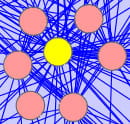
A major goal of cancer research is to find specific therapies directed at molecular disease targets. High-throughput technologies can now be used to identify hundreds or even thousands of candidate genes (e.g., genes with genomic alterations or differentially expressed genes) in a cancer. However, it is difficult to prioritize potential therapeutic targets from such a large amount of candidate genes. The vast array of in silico resources currently available in life sciences research offers the possibility of aiding the drug discovery process. TARGETgene is a MATLAB tool that exploits these resources to effectively identify potential therapeutic targets and drugs in cancer using genetic network-based approaches.
TARGETgene can rapidly extract genetic interactions from a precompiled database stored as a MATLAB MAT-file without the need to interrogate remote SQL databases. Millions of interactions involving thousands of candidate genes can be mapped to the genetic network within minutes. While TARGETgene is currently based on the gene network reported in (Wu et al.,Bioinformatics 26:807-813, 2010), it can be easily extended to allow the optional use of other developed gene networks. The simple graphical user interface also enables rapid, intuitive mapping and analysis of therapeutic targets at the systems level. By mapping predictions to drug-target information, TARGETgene may be used as an initial drug screening tool that identifies compounds for further evaluation. In addition, TARGETgene is expected to be applicable to identify potential therapeutic targets for any type or subtype of cancers, even those rare cancers that are not genetically recognized.
TARGETgene has been developed by the Biomedical Simulations Resource at the University of Southern California, under support from the National Institute for Biomedical Imaging and Bioengineering (NIBIB) at the National Institutes of Health (P41-EB001978). It is distributed by the BMSR at no charge to the user, under the terms of a Release Agreement. Our ability to further develop and support TARGETgene depends on the degree to which it is used by the research community. Accordingly, we ask that you acknowledge use of TARGETgene in your research publications, as appropriate, by citing:
Wu, C-C., D’Argenio, D.Z, Asgharzadeh, S. and T.J. Triche. TARGETgene: A tool for identification of potential therapeutic targets in cancer. PLos ONE 7(8):e43305, 2012.
Please send email to perwu777@gmail.com with any questions or comments.
System Requirements
- Operating System
- Windows XP/Vista/7
- Memory REQUIRED
- Minimum of 4GB
Features in TARGETgene
Identification of Potential Therapeutic Targets
- Prioritize potential therapeutic targets from thousands of candidate genes generated from high-throughput experiments using network-based metrics
- Validate predictions (prioritization) using user-defined benchmark genes and curated cancer genes
- Explore biologic information of selected targets through external databases (e.g., NCBI Entrez Gene) and gene function enrichment analysis
Initial Drug Screening
- Identify for further evaluation existing drugs and compounds that may act on the potential therapeutic targets identified by TARGETgene
- Explore general information on identified drugs of interest through several external links
Latest Posts About TARGETgene
- TARGETgene 2.0betaA fusion gene that results from chromosome rearrangements is a hybrid gene formed from distinct genes, either in the same chromosome or in different chromosomes. Many recurring gene fusions, such as BCR-ABL in chronic myelogenous leukemia, EWS-FIL1 in Ewing’s Sarcoma, and TMPRSS2-ERG in prostate cancer, play important roles in cancer progression. As such, they have…Continue Reading TARGETgene 2.0beta
- Release of TARGETgeneThe vast array of in silico resources currently available in the life sciences research offers the possibility of aiding the drug discovery process. Core Project 1 of the BMSR has developed TARGETgene to exploit these resources and to allow the identification of potential therapeutic targets and drugs in cancer using genetic network-based approaches. TARGETgene is…Continue Reading Release of TARGETgene